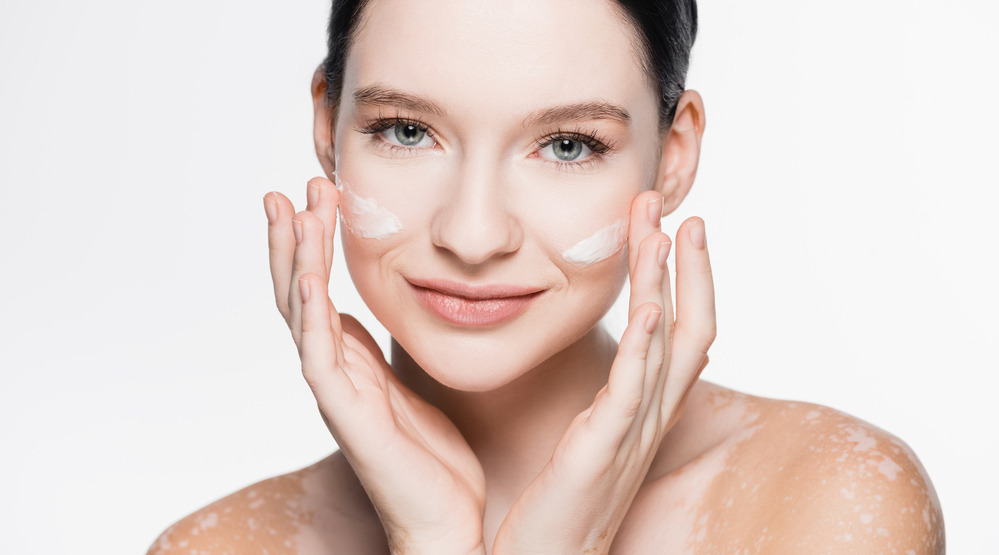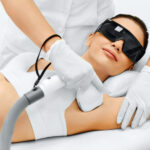Skin pigmentation is the variation in a person’s normal skin color where melanin gathers in an area creating a dark spot that varies in size. There are many types of hyperpigmentation, such as sunspots (liver spots), which are caused by sun exposure over time. There are many methods for remedying pigmentation, but the best treatment for pigmentation on the face is generally clinical pigment reduction.
What is hyperpigmentation?
Hyperpigmentation is patches of the skin that becomes darker than the surrounding areas caused by the increase in melanin. Melanin is the substance in the skin’s outer layer cells that when exposed to the sun, melanin is produced causing the skin to darken.
Melanin protects the skin from the sun’s harsh ultraviolet rays, and some areas may be affected differently to others causing age spots, birthmarks, freckles, and sunspots. These stand out as darker areas than the rest of your natural complexion and laser treatment for pigmentation is an effective option to reduce the appearance of dark spots.
Post-inflammatory hyperpigmentation is the result of injury or inflammation of the skin and Melasma is a common skin condition prevalent in pregnant women. It is stimulated by hormonal increases and also worsened with exposure to UV light. It occurs deeper in the skin’s dermis than regular pigmentation, which can be more difficult to remove.
A dermatologist can correctly diagnose and recommend various clinical treatments available.

What are popular options to treat pigmentation?
Pigmentation is a common skin condition and there are various treatment options available on the market ranging from over the counter medication to laser treatment for dark skin pigmentation. Various applications need to be done by professionals who are familiar with different processes that include chemical peels and laser treatment.
Chemical peels use a stronger acid concentration to treat the affected skin area and work by removing the epidermis or top layer of the skin. There are deeper versions that penetrate into the dermis or lower layers of the skin to produce more dramatic results. Laser peeling uses targeted beams of light to destroy skin cells that will then encourage new growth with normal pigmentation.
What are the popular ways to treat pigmentation at home?
The majority of home medications include over-the- counter (OTC) medication like lightening creams, face acids, and retinoids, which are derived from vitamin A. These are among the oldest OTC remedies used with small molecules allowing deep penetration into the skin layers.
Lightening creams are a topical application in a cream or gel form, which are typically a more affordable option. They help to decrease pigmentation but may take longer to work. These products are also available in stronger doses but only when prescribed by a doctor.
Additional options are available for anti-pigmentation treatment at home, which include natural remedies. Some of these are apple cider vinegar, which contains acetic acid and may lighten pigmentation although this is not guaranteed. Aloe vera contains aloin, which is a natural depigmenting compound that lightens the skin. Other remedies include red onions, green tea extract, black tea water, and liquorice extract found in over the counter creams to name a few.

Are they effective?
Dark spot pigmentation treatment at home can be very effective depending on the level of the pigmentation on the skin and what type of blemish it is, taking into consideration that very dark spots are generally a few layers into the dermis of the skin and would require a person to seek medical advice. Hyperpigmentation is a cosmetic issue, which does not pose any real threat other than the appearance on the skin.
What is laser pigmentation treatment?
Laser pigmentation removal is one of the most advanced treatments available on the market today. These specially designed lasers focus only on the darkened pigmentation and do not affect the surrounding tissue. This type of treatment uses different types of laser applications to treat various pigmentation issues. Freckles pigmentation treatment is a quick non-invasive process and can take as little as 1-3 treatments to remove.
How does it work?
Skin pigmentation treatment is available in the UK and uses lasers that produce wavelengths of high energy pinpoint light, which is then converted into heat energy. These can be focused on specific areas of pigmentation. As the laser light is only absorbed by the darker areas of pigmentation, the surrounding skin remains unaffected by the heat source.
Are there any side effects?
Generally, there are minimal side effects with laser pigmentation removal, however, there may be a little discomfort after the application with a slight reddening and mild swelling of the skin around the treated area. This discomfort can be relieved with the use of an ice pack applied to the skin. One should not consider treatments too close together as the skin needs to heal properly and regenerate new growth between applications.

What effects can be expected from home efforts to treat pigmentation?
Depending on the severity of the pigmentation, various home applications can be tried, however, they generally include a mild exfoliation, which does not penetrate deep enough into the skin to cause any permanent change. Topical cream treatments are designed to penetrate the skin’s protective layers.
Can laser treatment remove pigmentation? Yes, this is one of the most effective processes to reduce skin blemishes when carried out by a professional.
What effect can be expected from clinical laser pigment reduction, what benefits it provides?
Pigmentation removal treatment with the use of specialized laser equipment can dramatically reduce the visual impact dark spots have on the face and body. Depending on the severity of the pigmentation will determine the rate of reduction and the number of applications required as specified by your practitioner. Subsequent to clinical laser reduction treatment, you can use makeup conceals areas when the patients feel self-conscious while the process is happening.
Latest News
- August 25, 2021
- August 25, 2021
- July 21, 2021
- July 20, 2021
- June 21, 2021





